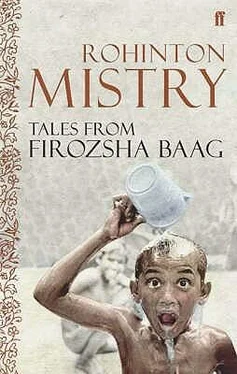Rohinton Mistry - Tales From Firozsha Baag
Здесь есть возможность читать онлайн «Rohinton Mistry - Tales From Firozsha Baag» весь текст электронной книги совершенно бесплатно (целиком полную версию без сокращений). В некоторых случаях можно слушать аудио, скачать через торрент в формате fb2 и присутствует краткое содержание. Год выпуска: 2006, Издательство: Faber & Faber, Жанр: Современная проза, на английском языке. Описание произведения, (предисловие) а так же отзывы посетителей доступны на портале библиотеки ЛибКат.
- Название:Tales From Firozsha Baag
- Автор:
- Издательство:Faber & Faber
- Жанр:
- Год:2006
- ISBN:нет данных
- Рейтинг книги:3 / 5. Голосов: 1
-
Избранное:Добавить в избранное
- Отзывы:
-
Ваша оценка:
- 60
- 1
- 2
- 3
- 4
- 5
Tales From Firozsha Baag: краткое содержание, описание и аннотация
Предлагаем к чтению аннотацию, описание, краткое содержание или предисловие (зависит от того, что написал сам автор книги «Tales From Firozsha Baag»). Если вы не нашли необходимую информацию о книге — напишите в комментариях, мы постараемся отыскать её.
Tales From Firozsha Baag — читать онлайн бесплатно полную книгу (весь текст) целиком
Ниже представлен текст книги, разбитый по страницам. Система сохранения места последней прочитанной страницы, позволяет с удобством читать онлайн бесплатно книгу «Tales From Firozsha Baag», без необходимости каждый раз заново искать на чём Вы остановились. Поставьте закладку, и сможете в любой момент перейти на страницу, на которой закончили чтение.
Интервал:
Закладка:
But when she saw the airmail envelope with a Canadian stamp her face lit up, she said wait to the postman, and went in for a fifty paisa piece, a little baksheesh for you, she told him, then shut the door and kissed the envelope, went in running, saying my son has written, my son has sent a letter, and Father looked up from the newspaper and said, don’t get too excited, first read it, you know what kind of letters he writes, a few lines of empty words, I’m fine, hope you are all right, your loving son — that kind of writing I don’t call letter-writing .
Then Mother opened the envelope and took out one small page and began to read silently, and the joy brought to her face by the letter’s arrival began to ebb; Father saw it happening and knew he was right, he said read aloud, let me also hear what our son is writing this time, so Mother read: My dear Mummy and Daddy, Last winter was terrible, we had record-breaking low temperatures all through February and March, and the first official day of spring was colder than the first official day of winter had been, but it’s getting warmer now. Looks like it will be a nice warm summer. You asked about my new apartment. It’s small, but not bad at all. This is just a quick note to let you know I’m fine, so you won’t worry about me. Hope everything is okay at home .
After Mother put it back in the envelope, Father said everything about his life is locked in silence and secrecy, I still don’t understand why he bothered to visit us last year if he had nothing to say; every letter of his has been a quick note so we won’t worry — what does he think we worry about, his health, in that country everyone eats well whether they work or not, he should be worrying about us with all the black market and rationing, has he forgotten already how he used to go to the ration-shop and wait in line every week; and what kind of apartment description is that, not bad at all; and if it is a Canadian weather report I need from him, I can go with Nariman Hansotia from A Block to the Cawasji Framji Memorial Library and read all about it, there they get newspapers from all over the world .
The sun is hot today. Two women are sunbathing on the stretch of patchy lawn at the periphery of the parking lot. I can see them clearly from my kitchen. They’re wearing bikinis and I’d love to take a closer look. But I have no binoculars. Nor do I have a car to saunter out to and pretend to look under the hood. They’re both luscious and gleaming. From time to time they smear lotion over their skin, on the bellies, on the inside of the thighs, on the shoulders. Then one of them gets the other to undo the string of her top and spread some there. She lies on her stomach with the straps undone. I wait. I pray that the heat and haze make her forget, when it’s time to turn over, that the straps are undone.
But the sun is not hot enough to work this magic for me. When it’s time to come in, she flips over, deftly holding up the cups, and reties the top. They arise, pick up towels, lotions and magazines, and return to the building.
This is my chance to see them closer. I race down the stairs to the lobby. The old man says hullo. “Down again?”
“My mailbox,” I mumble.
“It’s Saturday,” he chortles. For some reason he finds it extremely funny. My eye is on the door leading in from the parking lot.
Through the glass panel I see them approaching. I hurry to the elevator and wait. In the dimly lit lobby I can see their eyes are having trouble adjusting after the bright sun. They don’t seem as attractive as they did from the kitchen window. The elevator arrives and I hold it open, inviting them in with what I think is a gallant flourish. Under the fluorescent glare in the elevator I see their wrinkled skin, aging hands, sagging bottoms, varicose veins. The lustrous trick of sun and lotion and distance has ended.
I step out and they continue to the third floor. I have Monday night to look forward to, my first swimming lesson. The high school behind the apartment building is offering, among its usual assortment of macramé and ceramics and pottery classes, a class for non-swimming adults.
The woman at the registration desk is quite friendly. She even gives me the opening to satisfy the compulsion I have about explaining my non-swimming status.
“Are you from India?” she asks. I nod. “I hope you don’t mind my asking, but I was curious because an Indian couple, husband and wife, also registered a few minutes ago. Is swimming not encouraged in India?”
“On the contrary,” I say. “Most Indians swim like fish. I’m an exception to the rule. My house was five minutes walking distance from Chaupatty beach in Bombay. It’s one of the most beautiful beaches in Bombay, or was, before the filth took over. Anyway, even though we lived so close to it, I never learned to swim. It’s just one of those things.”
“Well,” says the woman, “that happens sometimes. Take me, for instance. I never learned to ride a bicycle. It was the mounting that used to scare me, I was afraid of falling.” People have lined up behind me. “It’s been very nice talking to you,” she says, “hope you enjoy the course.”
The art of swimming had been trapped between the devil and the deep blue sea. The devil was money, always scarce, and kept the private swimming clubs out of reach; the deep blue sea of Chaupatty beach was grey and murky with garbage, too filthy to swim in. Every so often we would muster our courage and Mummy would take me there to try and teach me. But a few minutes of paddling was all we could endure. Sooner or later something would float up against our legs or thighs or waists, depending on how deep we’d gone in, and we’d be revulsed and stride out to the sand.
Water imagery in my life is recurring. Chaupatty beach, now the high-school swimming pool. The universal symbol of life and regeneration did nothing but frustrate me. Perhaps the swimming pool will overturn that failure.
When images and symbols abound in this manner, sprawling or rolling across the page without guile or artifice, one is prone to say, how obvious, how skilless; symbols, after all, should be still and gentle as dewdrops, tiny, yet shining with a world of meaning. But what happens when, on the page of life itself, one encounters the ever-moving, all-engirdling sprawl of the filthy sea? Dewdrops and oceans both have their rightful places; Nariman Hansotia certainly knew that when he told his stories to the boys of Firozsha Baag.
The sea of Chaupatty was fated to endure the finales of life’s everyday functions. It seemed that the dirtier it became, the more crowds it attracted: street urchins and beggars and beachcombers, looking through the junk that washed up. (Or was it the crowds that made it dirtier? — another instance of cause and effect blurring and evading identification.)
Too many religious festivals also used the sea as repository for their finales. Its use should have been rationed, like rice and kerosene. On Ganesh Chaturthi, clay idols of the god Ganesh, adorned with garlands and all manner of finery, were carried in processions to the accompaniment of drums and a variety of wind instruments. The music got more frenzied the closer the procession got to Chaupatty and to the moment of immersion.
Then there was Coconut Day, which was never as popular as Ganesh Chaturthi. From a bystander’s viewpoint, coconuts chucked into the sea do not provide as much of a spectacle. We used the sea, too, to deposit the leftovers from Parsi religious ceremonies, things such as flowers, or the ashes of the sacred sandalwood fire, which just could not be dumped with the regular garbage but had to be entrusted to the care of Avan Yazad, the guardian of the sea. And things which were of no use but which no one had the heart to destroy were also given to Avan Yazad. Such as old photographs.
Читать дальшеИнтервал:
Закладка:
Похожие книги на «Tales From Firozsha Baag»
Представляем Вашему вниманию похожие книги на «Tales From Firozsha Baag» списком для выбора. Мы отобрали схожую по названию и смыслу литературу в надежде предоставить читателям больше вариантов отыскать новые, интересные, ещё непрочитанные произведения.
Обсуждение, отзывы о книге «Tales From Firozsha Baag» и просто собственные мнения читателей. Оставьте ваши комментарии, напишите, что Вы думаете о произведении, его смысле или главных героях. Укажите что конкретно понравилось, а что нет, и почему Вы так считаете.












